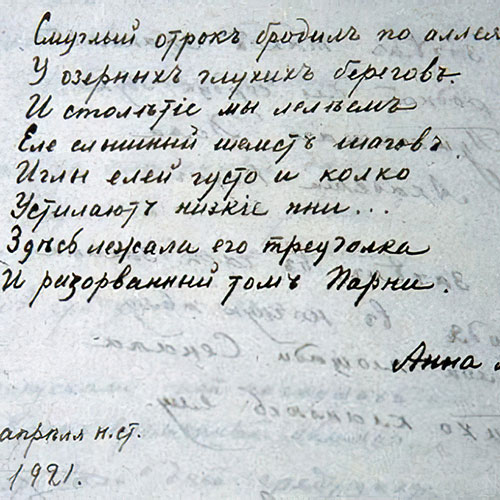
Tsarskoye Selo, “Czar’s Village,” is the Russian Versailles, fifteen miles south of Saint Petersburg, with two palaces set in eight hundred acres of park, extending the implausible three-dimensional paisley of its lawns and topiary, obelisques and follies admiring themselves in a man-made lake wide enough to sail on — groves and gardens populated by random classical statues, while, outside this perfect world — a no less perfect town, broad boulevards lined with great family mansions. —
A note from the translator.
1
Along these broad tree-shaded ways
they promenade horses with manes as long
and wavy, and carefully combed
as a lady’s hair. Magical,
impossible town
whose very existence seems a riddle.
Sad as I am, I must love you.
Here I longed for a man with all my soul,
panted, delirious, like a dying woman —
it now seems so unreal.
Somehow, I turned into a toy,
like everything else in Tasrskoye Selo’s
clockwork, music-box world —
a splendid pet, like my pink cockatoo.
I no longer feel that tension in my chest,
that anticipation of pain.
Don’t believe me? Look into my eyes.
If I seem glum, it’s because
I’ve never liked that last afternoon hour
before sunset, or the chilling wind
that blows in off the sea,
or the words “time to go.”
2
And here’s my marble counterpart, sprawled,
propped up on one elbow, leaning defeatedly
under an ancient maple:
a done-in Adonis.
This dying god hearkens
to the green, the muffled rustling
of leaves, possibly comforting
to a dying and reviving vegetation god —
but he’s given his full attention to the lake
which faithfully returns his perfect face.
Pale rainwater washes
the immortal gore of his marble-carven wound.
Wait, my cold, white other self,
I will, in my own way, also turn
into woeful stone
and feel as little as you.
3
Along these paths and through this park
wandered once a swarthy young man —
his great grandfather was a nobleman from Africa
captured by the Ottoman Turks who gave him
as a present to Peter the Great.
The young man was Pushkin, who thoroughly enjoyed
his un-Russian complexion
which made him visibly as well as inwardly
an exotic breed.
Along the shores of this lake he sadly
strolled, in Byronic melancholy.
A century later we’re still thrilled to think
he, even as we, walked here,
supposing we hear in the rustle of our footsteps
among these autumn leaves
a faint echo of his.
Beneath those pines, where the roots protrude
from the thick and prickly carpeting of needles,
perhaps it was there he set down
his tricornered hat,
and a dog-eared volume of his favorite poet.
I
По аллее проводят лошадок
Длинны волны расчесанных грив.
О, пленительный город загадок,
Я печальна, тебя полюбив.
Странно вспомнить: душа тосковала,
Задыхалась в предсмертном бреду,
А теперь я игрушечной стала,
Как мой розовый друг какаду.
Грудь предчувствием боли не сжата,
Если хочешь, в глаза погляди.
Не люблю только час пред закатом,
Ветер с моря и слово «уйди».
22 февраля 1911
Царское Село
II
...А там мой мраморный двойник,
Поверженный под старым клёном,
Озёрным водам отдал лик,
Внимает шорохам зелёным.
И моют светлые дожди
Его запекшуюся рану...
Холодный, белый, подожди,
Я тоже мраморною стану.
1911
III
Смуглый отрок бродил по аллеям,
У озёрных грустил берегов,
И столетие мы лелеем
Еле слышный шелест шагов.
Иглы сосен густо и колко
Устилают низкие пни...
Здесь лежала его треуголка
И растрепанный том Парни.
24 февраля 1911
Царское Село